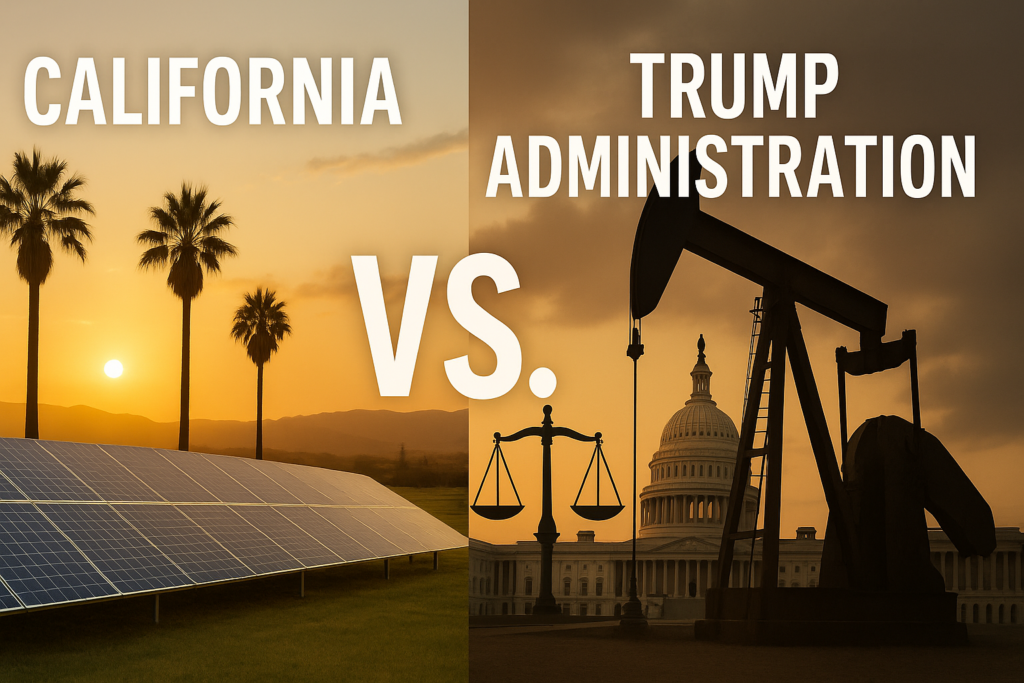On June 14, 2025, California sued the Trump administration after it revoked waivers allowing the state to set stricter vehicle emission rules under the Clean Air Act. Governor Gavin Newsom and Attorney General Rob Bonta, joined by ten other states, filed the lawsuit in U.S. District Court, arguing the revocation is illegal.
Background
California’s authority to set its own vehicle emission standards dates back to the 1970s, the Clean Air Act has allowed California to request EPA waivers to enforce tougher emission standards due to its severe smog problems. The disputed waivers, granted under the Biden administration, supported California’s plans to phase out sales of new gas-powered cars by 2035, reduce diesel truck emissions, and enforce stricter nitrogen oxide (NOx) standards for heavy-duty trucks. These regulations aimed to save Californians an estimated $45 billion in healthcare costs and provide $91 billion in economic benefits through 2040 by promoting zero-emission vehicles.
September 18, 2019: Trump administration revokes California’s Clean Air Act waiver, limiting its ability to set stricter vehicle emission standards.
November 15, 2019: California, 22 states, Washington, D.C., Los Angeles, and New York sue, arguing the revocation violates the Clean Air Act.
July 2019–2021: California negotiates with four automakers (Ford, Honda, Volkswagen, BMW) to meet modified emission standards. Lawsuits remain unresolved until Biden reinstates the waiver in 2022.
January 20, 2025: President Trump signs executive order to reverse Biden-era clean energy policies, targeting California’s vehicle emission waivers.
January 24, 2025: Trump administration asks Supreme Court to pause a case challenging California’s 2022 waiver, signaling a review of EPA decisions.
May 22, 2025: U.S. Senate votes to revoke three California waivers (ACC II, ACT, Omnibus) using the Congressional Review Act, following House vote. California and 10 states plan lawsuit, arguing CRA misuse.
June 12, 2025: Trump signs CRA resolutions, revoking waivers for California’s clean vehicle rules. California and 10 states file lawsuit in U.S. District Court, alleging illegal CRA use. Governor Newsom orders new clean air mandates.
June 13, 2025: California’s lawsuit claims revocation threatens public health and economic benefits. Trump defends action, citing auto industry and consumer choice.
The Current Dispute
The Trump administration used the Congressional Review Act (CRA) to cancel three waivers, a first in the Clean Air Act’s history. California says this is unlawful, as waivers aren’t federal rules subject to CRA. The administration argues only the federal government can set emission standards, claiming California’s rules overstep by addressing global climate issues, not just local air quality.
Key Points
California’s View: The state says its waivers are legal, backed by decades of precedent, and vital for public health and clean energy.
Trump Administration’s View: The administration wants uniform national standards to ease automaker regulations, arguing California’s rules increase costs and exceed state authority.
Implications: The lawsuit could decide whether states can set their own environmental rules. A California win would support state-led innovation; a federal win could limit state autonomy.
As of April 2025, 17 states and the District of Columbia have adopted California’s vehicle emission standards, including the Low-Emission Vehicle (LEV) standards, with 14 of these also adopting the Zero-Emission Vehicle (ZEV) program. These states are: Colorado, Connecticut, Delaware, Maine, Maryland, Massachusetts, Minnesota, Nevada, New Jersey, New Mexico, New York, Oregon, Pennsylvania, Rhode Island, Vermont, Virginia, and Washington.
Some states, like Virginia, have faced efforts to repeal these standards, and adoption of specific rules, such as the Advanced Clean Cars II (ACCII), varies. For example, eight states have adopted the Advanced Clean Trucks (ACT) rule: California, Oregon, Washington, Massachusetts, Vermont, New York, New Jersey, and Colorado, with Maryland and North Carolina in process as of January 2024.
What’s Next
The case, likely headed to the Supreme Court, will shape how states and the federal government share power over environmental policy. California is already planning new clean air measures to continue its efforts.
📬 Subscribe to ESG News Daily Brief to stay informed with trusted sustainability news every afternoon. Follow ESG News on LinkedIn

